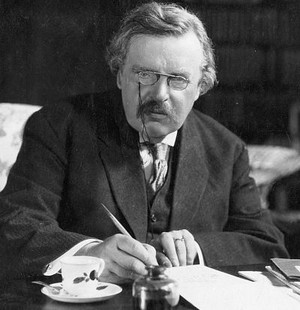
As a fan of G. K. Chesterton, I was disappointed to hear that Bishop Peter Doyle of Chesterton's home diocese of Northampton in England has decided not to open the cause for Chesterton's sainthood.
In a letter - which was read at last week's American Chesterton Society's annual conference - Bishop Doyle cited as his reasons: “…I am unable to promote the cause of GK Chesterton for three reasons. Firstly, and most importantly, there is no local cult. Secondly, I have been unable to tease out a pattern of personal spirituality. And, thirdly, even allowing for the context of G K Chesterton’s time, the issue of anti-Semitism is a real obstacle particularly at this time in the United Kingdom.”
The Catholic World Report has its own spin on news.
I am not in a position to investigate the first two of the reasons Bishop Doyle gave.
Despite a number of very active Chesterton societies around the world and some very active and passionate promoters of his life and work, it may well be that there is in Chesterton's home diocese no local cult. Given the weakened condition of Christianity in England at this time, I don't find that surprising, but I also am not there so I don't know what the situation is. I don't believe the bishop is lying, but certainly bishops don't always know the full extent of what's going on in their dioceses.
Chesterton's writings certainly give evidence to the importance of faith in his life, and those writings have spiritually inspired many people from C. S, Lewis to Joseph Pearce. But even though I have read many of his writings, and multiple biographies, I don't know if his "pattern of person spirituality" rises to the level of sainthood. It may, and perhaps there is more to be uncovered to corroborate that, but I don't know. I have not read all of his writings. I don't have access to any of his personal papers that might shed additional light. I have not interviewed people who knew him.
The last point is a more difficult one to address.
Chesterton clearly did say some things about Jewish people that make modern readers feel uncomfortable. (He also used the "n" word when referring to Blacks.) At the same time, he did defend Jewish people, and included Jews among his friends. His use of stereotypes and certain words/phrases seem to me to be more a reflection of his times and not some ingrained bigotry. I remember as a child in the 1960s were told all sorts of ethnic jokes about Italians, Irish, and Poles that today would be considered offensive. But I also don't believe we should condemn people today for making an ethnic joke in 1968; what more telling is how they talk and act in more recent times.
Of course, Chesterton is dead, so we have no way to measure if he grew or changed.
But as the bishop suggested, given contemporary sensibilities, this might be a difficult one to overcome.
So there it is, the cause is stalled for now.
For now.
Apparently Bishop Doyle has reached retirement age. A new bishop will be appointed in the next year or two, and could reopen the cause.
What Chestertonians with more power and knowledge than I should be busy trying to make known or encourage a "local cult." They should also explore and make known Chesterton's "pattern of personal spirituality." If those two areas can be addressed, it might help the cause
The last problem, the allegations of anti-Semitism, have been explored in articles and talks, but there apparently needs to be more done. Again, it may not be enough, given current sensibilities, but there's no harm in trying.
And there's no reason to give up hope. There are many saints who have troubling or misunderstood details in their lives. These three objections might fade in significance with new discoveries and a new bishop. Perhaps there will be yet another path that will open. I don't see Dale Ahlquist giving up that easily!
On the other hand, maybe Chesterton himself would say it's not worth the effort. He might even voice the view of Dorothy Day, another holy person some have promoted for sainthood, who once said when asked about such talk, "Don't call me a saint. I don't want to be dismissed so easily."
And Chesterton himself might be chuckling about all this.
“It is the test of a good religion whether you can joke about it.”
Pax et bonum
No comments:
Post a Comment